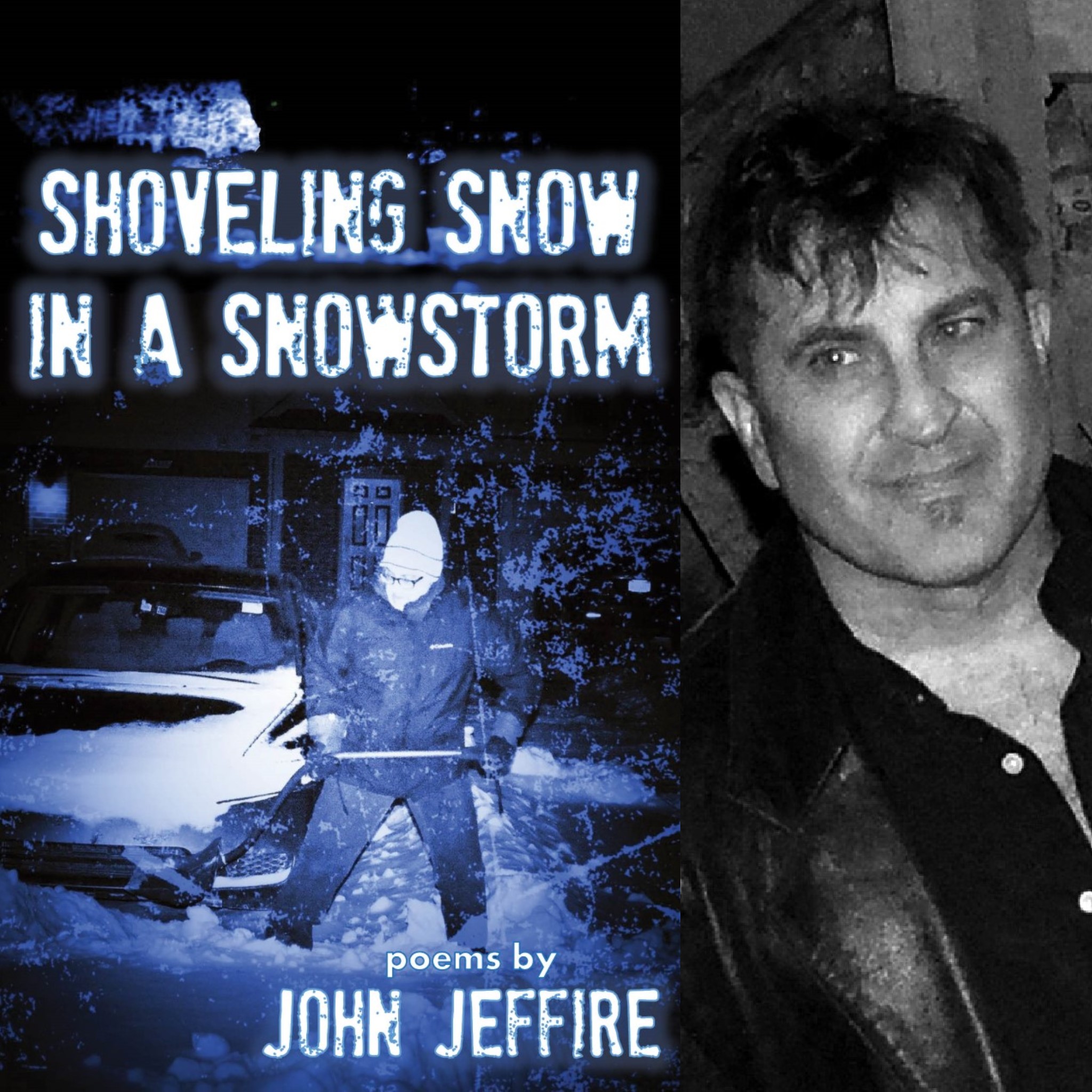“In John Jeffire’s Detroit, addiction whispers, ‘Don’t kill me.’ Smiles are rare, and they prefer to slit faces rather than brighten them. The residents lap Stroh’s, their faces sweated. Everyone and everything are soiled. But the poems, themselves, shine through. Jeffire masterfully juxtaposes familiarity with surprise – these are characters you know, but you’ve never seen them act like this. He couples interesting wordplay with intelligent diction, making delightful every sadness, illness found within these pages. Yes, these poems make the reader wince, but they also make the reader stay, as their universality remind said read that he, too, has lived in this place.”
—Adrienne Christian, author of 12023 Woodmont Avenue
“In a snowstorm, the speaker navigates, even as he is at once marooned and adrift in a roiling sea of snow—a rusted shovel, his compass. On the surface, the shoveling seems futile, but deeper, it offers a small measure of control, making the storm and life itself more manageable. Amid challenging landscapes, this collection is buoyed with a sense of determination and possibility. In Detroit he writes: ‘And every time you kicked my shit/And tripped my wire I found my knees/And crawled into your backseat.’ With street-tough metaphors, compassion, and an unflinching eye Jeffire invites us to see and to feel places inhabited by junkies and asylums and stray dogs—and we want to go, because it’s a great ride.”
—Diane DeCillis, author of Strings Attached, a 2015 Michigan Notable Book and Winner of the 2015 Next Generation Independent Book Award for Poetry
“Shoveling Snow in a Snowstorm continues the examination of the life’s ills, grit, and consequences through a rustbelt lens. In the tradition of Phillip Levine, John Jeffire peels back the scab off Detroit while expressing a love for the city as well. Sometimes you hear the voice of the proverbial underdog: “I’ve quit counting the kicks/And yet battered dog that I am/I slink back, bruised, the past/Dried in Salty pissing on my face.” Others times the voice is full of nostalgic blue collar symbolism: “He walked Chevy in the Hole/In Flint as it gagged alkaline into/The undrinkable fecal river.” The poems in this collection are barefoot walks through back alleys painted with passion and regret. “What We Talk About When We Talk About Love” is about more than the title suggest and “Catechism” feels brutality honest. John Jeffire walks a perfect line between romanticizing the past and keeping it real.”
—Kahn Santori Davison, author of Blaze
“John Jeffire’s poems wrestle with life, and teem with muscular, inventive language. “But please, if you can, answer me this:/If sadness is sickness,/Then who has not lived here/In this place?” These poems are a fearsome ride which digs deeply at the surface of things, and leads us to shovel snow, sit in a psychiatric ward, to work in the River Rouge in Detroit, to look inside our hearts. These are works of survival, of praise for the way life and love can still surprise like a punch. “So what I mean, what I’m trying/To say in some small way, is Lady,/Come home, soon, please come home.””
—Nadia Ibrashi, winner of the X.J. Kennedy Prize
“There is fire in these poems, fire and ash and smoke, and the ghost of Phil Levine is kept alive by poets like John Jeffire who aren’t afraid to honor such a debt. These are poems that know the city of Detroit and its history that they come from and remain faithfully tethered too. This is poetry that makes use of the world around us and reminds us what it means to be alive inside our own skins, which like a poem is its own kind of temporary song.”
—Peter Markus, author of The Singing Fish
“From the crevices and corners of Detroit’s post-industrial decay come John Jeffire’s fierce and fiery poems. There’s no respite from the brutality of cheap motels, psychiatric wards, abandoned factories or the lives lived around them, but the poems themselves stand in triumph—”a gift,” as the poet writes of his birth, “of some sort to humanity.” Tough, noir, proud, loving, refusing to mourn, Jeffire’s poems capture the enduring voice of the working class and, like Philip Levine whose spirit he so ably invokes, spit in the eye of hypocrisy and oppression. It’s exhilarating to read poems like these, poems that have nothing left to lose.”
—Terry Blackhawk, Kresge Literary Fellow, 2013






Reviews
There are no reviews yet.